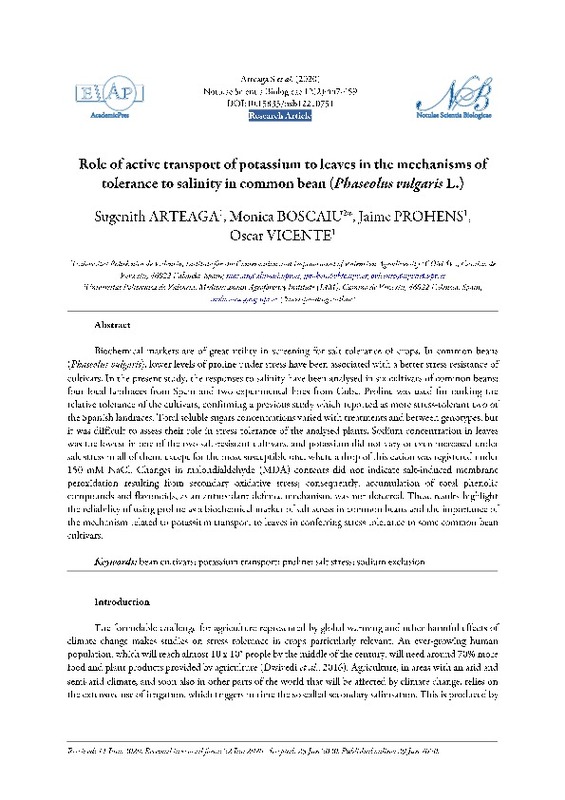JavaScript is disabled for your browser. Some features of this site may not work without it.
Buscar en RiuNet
Listar
Mi cuenta
Estadísticas
Ayuda RiuNet
Admin. UPV
Role of active transport of potassium to leaves in the mechanisms of tolerance to salinity in common bean (Phaseolus vulgaris L.)
Mostrar el registro sencillo del ítem
Ficheros en el ítem
| dc.contributor.author | Arteaga, Sugenith
|
es_ES |
| dc.contributor.author | Boscaiu, Monica
|
es_ES |
| dc.contributor.author | Prohens Tomás, Jaime
|
es_ES |
| dc.contributor.author | Vicente, Oscar
|
es_ES |
| dc.date.accessioned | 2021-11-05T12:37:11Z | |
| dc.date.available | 2021-11-05T12:37:11Z | |
| dc.date.issued | 2020-06-29 | es_ES |
| dc.identifier.issn | 2067-3205 | es_ES |
| dc.identifier.uri | http://hdl.handle.net/10251/176126 | |
| dc.description.abstract | [EN] Biochemical markers are of great utility in screening for salt tolerance of crops. In common beans (Phaseolus vulgaris), lower levels of proline under stress have been associated with a better stress resistance of cultivars. In the present study, the responses to salinity have been analysed in six cultivars of common beans: four local landraces from Spain and two experimental lines from Cuba. Proline was used for ranking the relative tolerance of the cultivars, confirming a previous study which reported as more stress-tolerant two of the Spanish landraces. Total soluble sugars concentrations varied with treatments and between genotypes, but it was difficult to assess their role in stress tolerance of the analysed plants. Sodium concentration in leaves was the lowest in one of the two salt-resistant cultivars, and potassium did not vary or even increased under salt stress in all of them, except for the most susceptible one, where a drop of this cation was registered under 150 mM NaCl. Changes in malondialdehyde (MDA) contents did not indicate salt-induced membrane peroxidation resulting from secondary oxidative stress; consequently, accumulation of total phenolic compounds and flavonoids, as an antioxidant defence mechanism, was not detected. These results highlight the reliability of using proline as a biochemical marker of salt stress in common beans and the importance of the mechanism related to potassium transport to leaves in conferring stress tolerance to some common bean cultivars. | es_ES |
| dc.language | Inglés | es_ES |
| dc.publisher | AcademicPres (EAP) Publishing House | es_ES |
| dc.relation.ispartof | Notulae Scientia Biologicae | es_ES |
| dc.rights | Reconocimiento (by) | es_ES |
| dc.subject | Bean cultivars | es_ES |
| dc.subject | Potassium transport | es_ES |
| dc.subject | Proline | es_ES |
| dc.subject | Salt stress | es_ES |
| dc.subject | Sodium exclusion | es_ES |
| dc.subject.classification | GENETICA | es_ES |
| dc.subject.classification | BIOQUIMICA Y BIOLOGIA MOLECULAR | es_ES |
| dc.subject.classification | BOTANICA | es_ES |
| dc.title | Role of active transport of potassium to leaves in the mechanisms of tolerance to salinity in common bean (Phaseolus vulgaris L.) | es_ES |
| dc.type | Artículo | es_ES |
| dc.identifier.doi | 10.15835/nsb12210751 | es_ES |
| dc.rights.accessRights | Abierto | es_ES |
| dc.contributor.affiliation | Universitat Politècnica de València. Departamento de Biotecnología - Departament de Biotecnologia | es_ES |
| dc.contributor.affiliation | Universitat Politècnica de València. Departamento de Ecosistemas Agroforestales - Departament d'Ecosistemes Agroforestals | es_ES |
| dc.description.bibliographicCitation | Arteaga, S.; Boscaiu, M.; Prohens Tomás, J.; Vicente, O. (2020). Role of active transport of potassium to leaves in the mechanisms of tolerance to salinity in common bean (Phaseolus vulgaris L.). Notulae Scientia Biologicae. 12(2):447-459. https://doi.org/10.15835/nsb12210751 | es_ES |
| dc.description.accrualMethod | S | es_ES |
| dc.relation.publisherversion | https://doi.org/10.15835/nsb12210751 | es_ES |
| dc.description.upvformatpinicio | 447 | es_ES |
| dc.description.upvformatpfin | 459 | es_ES |
| dc.type.version | info:eu-repo/semantics/publishedVersion | es_ES |
| dc.description.volume | 12 | es_ES |
| dc.description.issue | 2 | es_ES |
| dc.relation.pasarela | S\415326 | es_ES |
| dc.subject.ods | 15.- Proteger, restaurar y promover la utilización sostenible de los ecosistemas terrestres, gestionar de manera sostenible los bosques, combatir la desertificación y detener y revertir la degradación de la tierra, y frenar la pérdida de diversidad biológica | es_ES |








